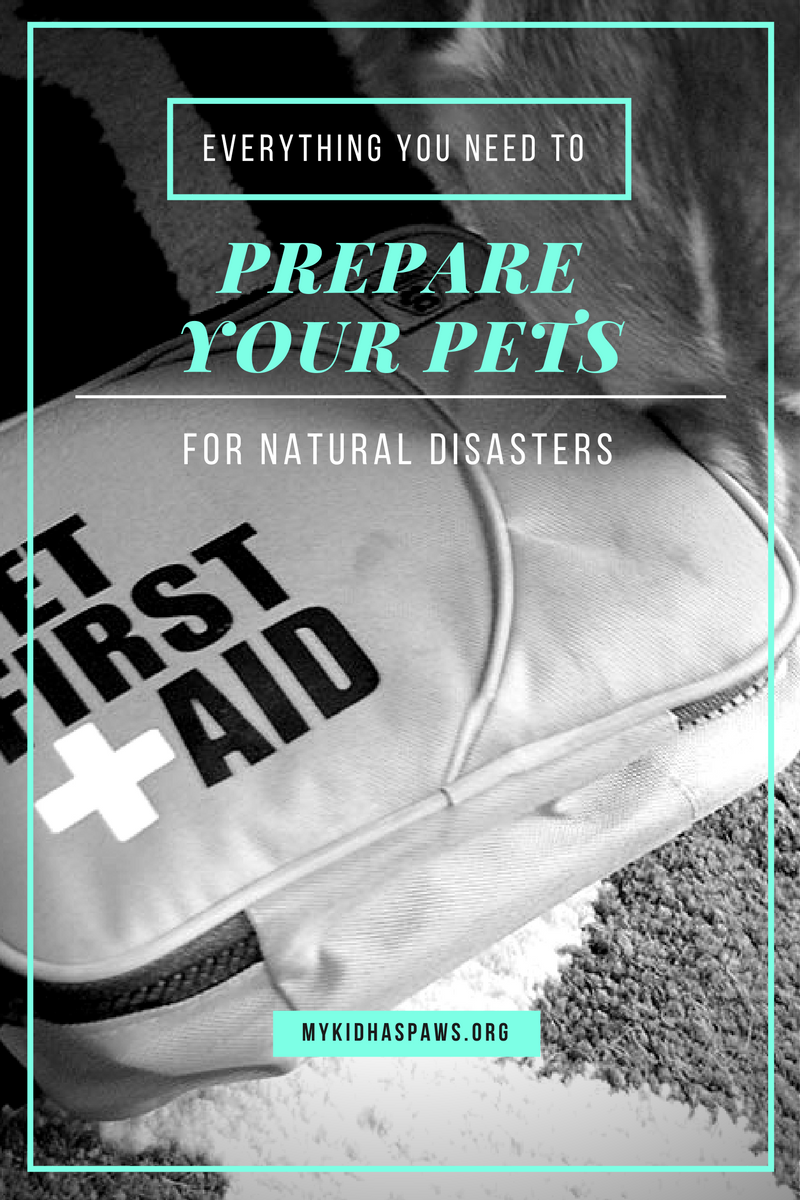As a Californian, I am grateful that there are very few natural disasters we need to worry about. However, we are not completely safe from Mother Nature. Specifically, us Californians need to be prepared for two common natural disasters earthquakes & wildfires!
Being prepared for natural disasters to happen is difficult. Specifically, because there isn’t always time to prepare for evacuation (especially with earthquakes). Although it is difficult to prepare for natural disasters themselves, we can prep necessities to react in the event something does happen.
Necessities for natural disasters:
First-Aid Kit
I have a first-aid kit for a variety of reasons; road trips, hiking trips, and emergencies. You can purchase one at your local pet store, or online, or you can make your own. If you already have a human first-aid kit, the DIY first-aid kits can be particularly helpful because you can combine the needs of you and your pets.
Secure Transportation
If you need to get in the car to evacuate, you want your dog or cat to be secure in the car (especially considering the additional chaos). Be sure to have an accessible crate that you can quickly secure in your car. It is also very helpful if your pet is used to a crate to avoid additional stress in an emergency situation.
List of Contacts
It’s always a good idea to have a list of contacts with you during your evacuation. Be sure to include your regular & emergency veterinarian along with a few other people that can be contacted in case of an emergency. If you want to be extra prepared, make sure the list is laminated so that it can’t be damaged by water.
Know Your Surroundings
The Red Cross recommends having a map of pet-friendly hotels and motels where you can stay in the event of an evacuation. For health and safety purposes, Red Cross stations don’t take pets that are not service animals.
Paperwork
Be sure to have a copy of your pet’s current vaccine records, and make sure their identification is up to date. Vaccine records are very important for staying at hotels and any other place of refuge in an emergency situation. As always, I highly recommend microchipping your pet and keeping the contact information up to date. In the event that your pet gets away and also loses their collar, any veterinary professional will immediately scan them to see if they are microchipped.
Leashes & Harnesses
I have said it several times before, and I will say it again. Extra leashes and harnesses are always a good idea (because you never know if you will see a stray dog while walking or driving, OR your leash might break). I also like to keep a slip leash with us because you can slip it on and move out of the house quickly and take your time to put on the proper leash and harness when you have the time. This is most appropriate for surprise evacuations like house fires or earthquakes.
Medications
Make sure that you have a few days worth of your pet’s medication if they are medication-dependent. For example, if you have an epileptic dog, be sure to keep a week’s worth of non-expired medication in your pet’s first aid kit and make a reminder to replace it every 6 months.
Basics
Although these items are basic, when you aren’t sure how far you will be from your home or how long you will be away, the basics are important.
Towel/Blanket – for warmth
Pet Bed (can keep this in the crate)
Water/Food Bowls
Food (weeks worth at least)
Can Opener (especially for cats)
Water Bottles (weeks worth at least)
The Red Cross has some additional tips and a printable checklist for you, which I highly recommend checking out.
What Can You Do if Your Family Isn’t Affected by the Natural Disaster?
Sometimes when natural disasters hit your area, your family gets lucky. You didn’t have to evacuate, and all of your family, pets, and friends are safe. But chances are, not everyone was so lucky.
Here in California, it isn’t unusual for us to know of a wildfire 50 miles North of us. While we are in many cases exempt from worry, there are still things we can do for the families and pets affected in those areas.
1. Call Your Local Emergency Hospital
Every year, there is a wildfire in Northern California. Last year my friend Kim, who is an emergency veterinary technician at my local emergency hospital went up to the fires to care for pets who were injured. She even brought back two kittens who needed long-term care due to severe burns.
Had I know that Kim was going up there, I would have called her and asked her if she needed any extra blankets, towels, collars or leashes (chances are I have a few of these in my house). So as soon as you know about these emergencies, make a call to your local emergency hospital and see if their staff is going to provide relief and if they are in need of anything you might be able to provide.
2. Foster
Contact the local animal shelters and let them know you have space in your home to foster. Chances are the animal shelters will be inundated with lost and injured pets from the disaster and they could use any extra space they can get. Offer to take some pets for a few weeks to provide the shelter with the much-needed space.
3. Offer to Provide Transportation
Work with the local shelters and rescue centers to help transport people and pets, or people with pets. Sometimes people not only lost their homes but also lost their form of transportation and it would be really helpful if they could visit their family or friends a few towns away. However, not everyone has the space or means to transport pets. If you have a vehicle that could be useful (like a van) offer to take people and/or pets to other destinations.
4. Donate
Donations to the Red Cross and local animal shelters can help support the rescue and response efforts. Often, social media pages and campaigns are set up quickly to help support the additional donations, so keep your eyes open for that information in the event of a disaster.
5. Share on Social Media
If you live in the area (or surrounding areas) you can share any lost pet posts. It may seem small, but social sharing can be very powerful and very important for getting pets reunited with their families.
I would love to hear your ideas!
What do you have in your disaster preparedness kit? What do you do when your local area has a natural disaster to help others?

Rooney and I would like to thank everyone for his birthday wishes! He had a great play day all day last Tuesday, and I think he really enjoyed his day.



Kismet
August 2, 2016 at 3:55 pmNatural disasters have to watch out for Kali.
Two French Bulldogs
August 3, 2016 at 6:58 amIt’s very important to have all these items ready to go.
Lily & Edward
Anne
August 3, 2016 at 7:59 amSo important. And a lot of the advice pertains to other kinds of disasters which require that you leave your home in a hurry, like a fire.
Anne recently posted…Blue cat blues
Leigh
August 3, 2016 at 11:00 amGreat tips! I never even thought about having extra leashes for stray dogs, and in the case of an earthquake, all of these are a must.
Leigh recently posted…Probiotics for Dogs: What You Must Know
M. K. Clinton
August 3, 2016 at 3:36 pmWe need to add to our evacuation kit but we do a quick grab bag just in case. These are excellent tips.
M. K. Clinton recently posted…7 Photos On The Road to Sedona
Jason Cruickshank
August 4, 2016 at 3:45 amWhatever happens, my dog is coming with me!
Jason Cruickshank recently posted…Hair Again Stop Hair Loss And Regrow A Full Head Of Hair
Groovy Goldendoodles
August 6, 2016 at 8:21 amThis was great timing considering August and September are usually hurricane months for us. Thanks.